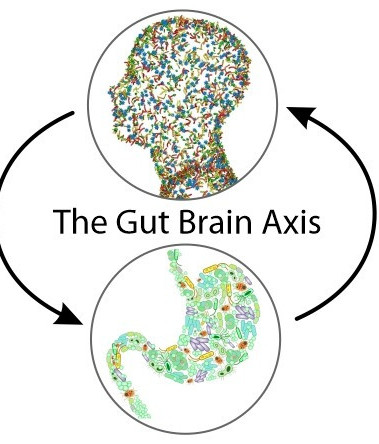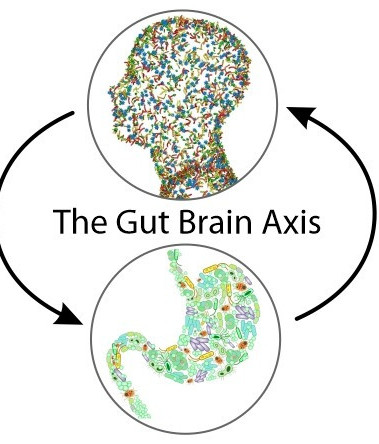
Have you felt “butterflies” in your stomach? It felt like you had to run to the bathroom when you first interviewed for a job or met a new person. What about someone saying I have a “gut feeling” this will not go well, or even people telling you, “trust your gut. ” This means you felt something in your gut because the emotion felt at the moment was so real. All these tell us how our gut and brain are connected, proving the importance of communicating with each other to function correctly.
How Does Your Gut Communicate With Your Brain?
The gut has 500 million neurons that operate like the superhighway between the gut and the brain. It’s called the brain-gut axis (1) and constantly updates what’s going on on both ends of state affairs. Here are two ways to facilitate their connection.
Physically
The gut and the brain are connected by the vagus nerve, also known as the “gut-brain axis,” which is the biggest nerve in the Central nervous system (CNS) that acts as the pathway between them and the other vital organs like the heart. (2) Here is a video explaining about the gut-brain axis
Chemically
The gut and brain can communicate by releasing chemicals like hormones and neurotransmitters that send messages back and forth to each other. These chemicals can be affected by bacteria, fungi, and viruses, which live in the gut, known as the “gut microbiome.” The microbiome can be harmful, harmless, or beneficial to your health depending on your gut health(3)
When the gut microbiome is out of balance, it affects many things like your …..
- Mood
- Pain tolerance
- Behavior
- Mental well-being
- Sleep
Why is the gut called the second brain?
The gut is called the second brain because it can operate independently without the central nervous system (CNS ), as indicated in this research (4) done by Founders University. It plays a vital role in our day-to-day decision-making. Also, the microbes in your gut affect the way you feel and behave.
The digestive tract has about 100 million neurons lining it. It is a massive network of nerve cells, so huge that it was nicknamed the second brain. The digestive system is also known as the enteric nervous system( ENS ), which has more nerve cells than the spinal cord.
How do you improve the brain-gut connection?
No diet is one hundred percent guaranteed to work for our gut or brain, but we have plenty of foods that can make both of them happy. These foods will give the nutrients they need to function properly as well as prevent diseases. Such foods like,
Omega 3
Foods like salmon, flaxseeds, and walnuts have been shown to lower cholesterol and high blood pressure and increase the gut microbiome’s diversity. (5) They also calm, increase memory and cognitive function, and reduce sugar cravings
Vitamin D
Lack of this vitamin causes depression, as well as inflammatory bowel disease. Here are some foods with vitamin D
- Fortified Milk,
- Salmon, and tuna,
- Shiitake mushrooms
- Orange juice,
Protein
Sources: Lean beef, turkey, chicken, fish, broccoli, Brussels sprouts, nuts, and eggs.
High-Fiber Foods
It decreases inflammation and increases gut microbes; sources include fruits and vegetables, nuts and seeds, and beans and legumes.
Fermented foods
They help by balancing and increasing the gut microbiota diversity; for example, Kimchi, Kefir, and Sauerkraut are excellent fermented food sources. The microbes from these foods act as probiotics, which help with indigestion and mood.
Always check with your healthcare provider before making any changes to your diet. Not everyone can tolerate fermented food, and it might react with the medication you are taking.
Limiting artificial sweeteners and sugar
Foods that have added sugar can give you a sugar crash (6), leading to irritability and anxiety. Also, artificial sugars, like aspartame, can cause depression. Therefore, both artificial and added sugar are found in processed foods. Even foods we might think are healthy, like bread and yogurt, add artificial sugars.
Avoiding Alcohol consumption
Drinking alcohol can cause both physical and mental harm effect. Healthline.com has conducted a study following the gut flora of 41 alcoholics compared to 10 healthy individuals who drank low to no-alcohol drinks.
Results were about 27% (7) of the alcoholics had imbalanced gut microbiota, while the other group had no gut issues.
Getting Enough Sleep
Obesity has been associated with a lack of sleep. This study proves that changes to the gut flora after missing a few nights of sleep also cause weight gain. Hence, when you have a good gut microbiota, then comes a good night’s sleep.
Does gut health affect our brain health? 
What we eat affects our gut and brain health. The food we eat is digested by our gut microbes, which change it into nutrients that nourish our body. If we don’t eat the right food, our bodies will suffer the consequences. When the gut microbiome is out of balance, you start experiencing bloating, stomach cramps, gas, and diarrhea.
Therefore, what we eat impacts our overall health, including our brain. The vagus nerve mediates the connection between the gut-brain axis; it sends information to both sides. A healthy gut communicates with your brain through the nerves and hormones, maintaining your general health and well-being.
The gut microbiome produces about 90% of serotonin (8). That is why there is a correlation between gut and mental disorders such as anxiety, depression, and other mental health illnesses. ( 9) Research shows a link between what we put in our bodies and the health of our minds. Hence, healthy food for your gut equals a healthy brain, plain and simple.
References
1.https://www.ncbi.nlm.nih.gov/pmc/articles/PMC3845678/
2.https://www.mhanational.org/fitness-4mind4body-gut-brain-connection
3. https://www.eurekalert.org/pub_releases/2018-05/sfn-bn052218.php
4..https://www.ncbi.nlm.nih.gov/pmc/articles/PMC5593975/
5. https://www.ncbi.nlm.nih.gov/pmc/articles/PMC6779243/
6.. https://news.sanfordhealth.org/healthy-living/sugar-crash-effects/
7.https://www.ncbi.nlm.nih.gov/pmc/articles/PMC3362077/
8.https://www.sciencedaily.com/releases/2019/09/190906092809.htm#:~:text=An estimated 90% of the transport serotonin into bacterial cells.
9. https://www.sutterhealth.org/health/nutrition/eating-well-for-mental-health

